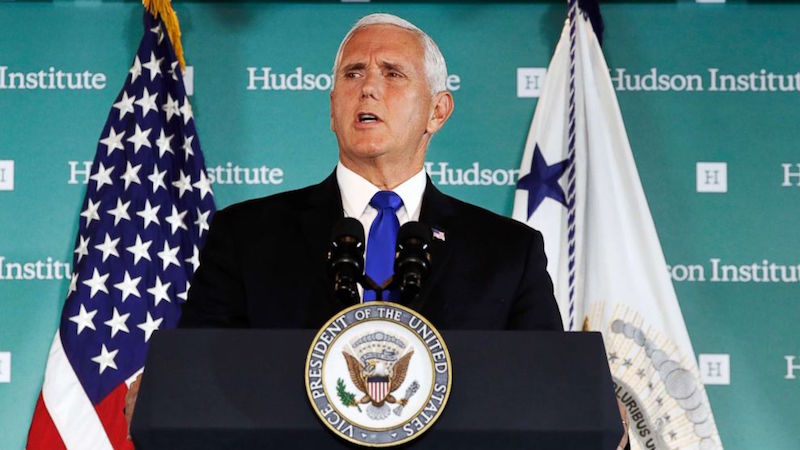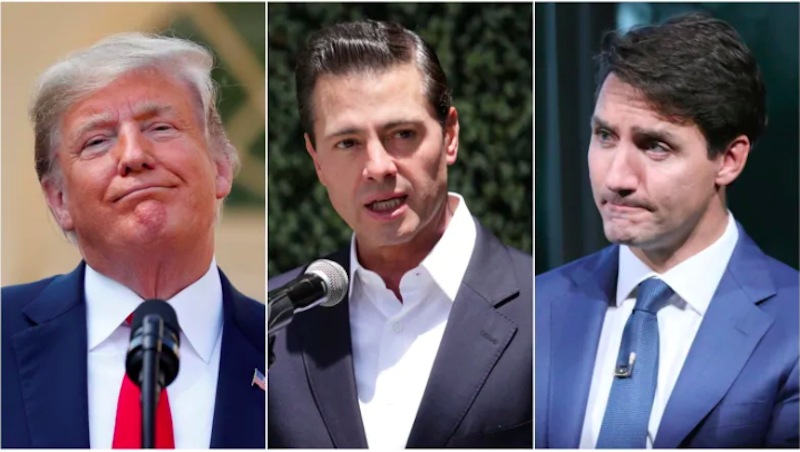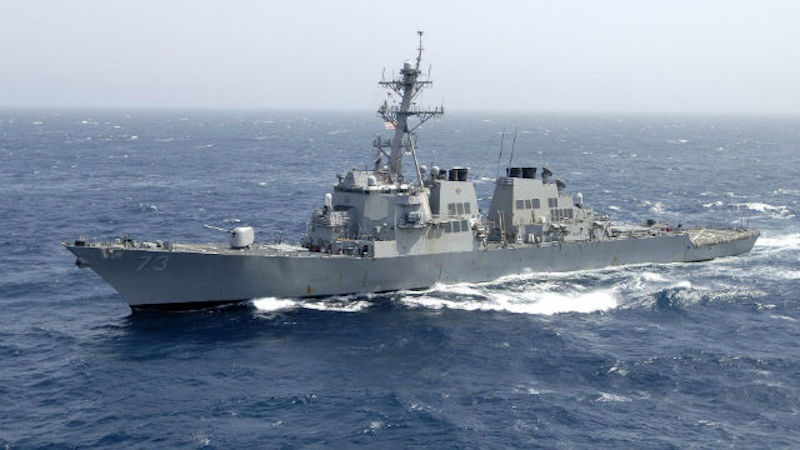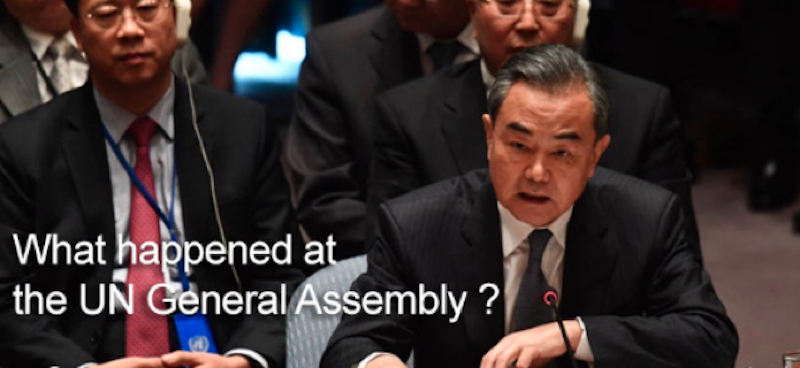
 U.S. Vice President Articulates Hard Line on China in Speech
U.S. Vice President Articulates Hard Line on China in Speech
In a sharply critical speech on Thursday, U.S. Vice President Mike Pence delivered a systematic indictment of China, touching on politics, security, human rights and trade policy, portending a much tougher administration line on China policy over the coming months. The speech centered around the allegation President Trump made at the UN General Assembly last week that China is seeking to undermine the U.S. president by interfering in the upcoming midterms. "Beijing is pursuing a comprehensive and coordinated campaign to undermine support for the president, our agenda, and our nation's most cherished ideals," Pence said in his remarks at the Hudson Institute in Washington D.C. on Thursday (available in full on our website.)
Pence also accused China of using a variety of methods to advance its interests globally, and particularly in the Asia Pacific, including economic coercion, military aggression, predatory trade policies and "debt diplomacy." The Chinese government was quick to respond to Pence's depiction. Chinese Foreign Ministry spokesperson Hua Chunying said, "The relevant speech made unwarranted accusations against China's domestic and foreign policies and slandered China by claiming that China meddles in U.S. internal affairs and elections."
Although prior to the speech senior officials — including President Trump — made overt comparisons to Russia, Pence's speech did not cite evidence of election interference. On Thursday, three Senate Democrats sent a letter to Director of National Intelligence Daniel Coats to request the release of "supporting intelligence" by Oct 8. "We request that you state publicly whether the president's statement is consistent with the assessments of the Intelligence Community," the letter reads.
In an interview with NPR on Thursday morning, Chinese Ambassador to the U.S., Cui Tiankai, said that there was insufficient goodwill and good faith between the U.S. and China, which was hampering efforts for the two countries to come to an agreement on disputes. "I think there's been some attempt on the U.S. side to force something like the U.S. will get 100 percent, and China will get zero. I don't think this is fair," he said.
 Meet the New NAFTA: USMCA
Meet the New NAFTA: USMCAAfter weeks of trade tensions with its continental partners and over a year of negotiations, on Sunday the United States finalized an updated agreement with Canada and Mexico. While many have described the United States-Mexico-Canada Agreement (USMCA) as merely "NAFTA 2.0," the new agreement contains major changes on environmental standards, labor and intellectual property policies. And while the title implies that the deal solely affects trade between the U.S., Mexico and Canada, clauses of the agreement may have dramatic consequences for trade policy with other nations, including China.
Specifically, Article 32.10 provides the United States with the ability to veto trade deals between, say, Canada and China if the U.S. dislikes the terms of that bilateral agreement. "Entry by any Party into a free trade agreement with a non-market country, shall allow the other Parties to terminate this Agreement on six-month notice," the relevant provision reads. As China-US Focus contributor Hugh Stephens noted for The Globe and Mail, this provision was "about containing China, and circumscribing Canadian options."
Economic observers argue that President Trump may take the completion of a deal with Canada and Mexico, particularly after clashes between the American president and his Mexican and Canadian counterparts over immigration and trade, as a justification of his protectionist policy. But as Martin Wolf argues in an article on our website, President Trump would be wrong to extend this confidence to dealings with China, saying, "The apparent victory over Canada and Mexico and the signing of a new trade deal will convince him he is right. But China is not Mexico."
While Presidents Donald Trump, Enrique Peña Nieto and Prime Minister Trudeau plan to sign the agreement prior to President Peña Nieto's departure from office in November, the USMCA still must be ratified by the three governments. With several forecasts of the American midterm elections predicting a partisan shake-up, challenges for the passage of the USMCA may be far from over.
 Near Collision in the South China Sea
Near Collision in the South China SeaA near collision between a U.S. navy warship and a Chinese warship in waters near the highly-contested Spratly Islands this past Sunday sparked strong responses from both sides, threatening further deterioration in military relations between China and the U.S. While conducting a freedom of navigation operation near Gaven Reef, the USS Decatur was approached to within 45 yards by a Chinese "Luyang class" destroyer, compelling it to switch direction.
Captain Charles Brown, a spokesman for the U.S. Pacific Fleet, said the Chinese ship "conducted a series of increasingly aggressive maneuvers accompanied by warnings for the Decatur to depart the area." Meanwhile, China's Defense Ministry said that it had dispatched the ship to warn the U.S. vessel to depart, "ma[king] checks against the U.S. vessel in accordance with the law," as spokesman Wu Qian said.
The incident is likely to compound tensions between Washington and Beijing, who have had recurring differences of opinion on freedom of navigations operations in the contested area. Officials from both countries reinforced their stances in statements about the incident this week. On Tuesday, Chinese Foreign Ministry spokesperson Hua Chunying said that China "strongly urges the U.S. side to. . .stop such provocative operations," while an American military official told CNN that "the United States will fly, sail and operate wherever international law allows."
As China-US Focus contributor Richard Weitz noted Friday, "The PLA's growing global presence has generated more instances when Chinese and U.S. military forces have operated in proximity, elevating the risks of further bilateral military incidents, whether due to accidents, miscalculation, or other causes."
 What Happened at the UN General Assembly?
What Happened at the UN General Assembly?General Assembly members from 193 states met last week to discuss global issues at the United Nations. In the newest episode of "At Large," James Chau takes a step back from the headline-grabbing moments of the General Assembly to concentrate on the important work being done. James reviews the converging interests of China and the U.S. on the denuclearization of the Korean Peninsula and explores how they can work together in achieving this goal. He also examines the divide between the two countries on the Joint Comprehensive Plan of Action (Iran Deal). Listen to the new episode of "At Large" here.
Prepared by China-US Focus editorial teams in Hong Kong and New York, this weekly newsletter offers you snap shots of latest trends and developments emerging from China every week, while adding a dose of historical perspective.
- 2018-09-28 A Turbulent Week For China-U.S. Relations at the UNGA
- 2018-09-21 China Will Not Purposefully Devalue the Yuan, Premier Li Keqiang Says
- 2018-09-14 China and the U.S. Discussing New Trade Talks, As Pressure Over Trade Policy Grows
- 2018-09-07 Forum on China-Africa Cooperation Yields New Pledges
- 2018-08-31 BRI’s Fifth Anniversary Comes Amidst Debate Over Sustainability
- 2018-08-24 Trade Talks Continue in DC as New Tariffs Hit
- 2018-08-17 Trade Talks Back On
- 2018-08-10 American Natural Gas Industry Braces for New Chinese Tariffs
- 2018-08-03 Tentative Signs of U.S.-China Cooperation at the ASEAN Summit
- 2018-07-27 President Trump’s Trade War Bailout
- 2018-07-20 Xi Charms the World
- 2018-07-13 China Defends WTO Record in the Face of Additional U.S. Tariffs
- 2018-07-06 The Trade War Begins
- 2018-06-29 President Trump Chooses Slightly Softer Option on Chinese Investment
- 2018-06-22 Trade Tensions Spark Stock Sell-Off in China
- 2018-06-14 How “Comprehensive” Is the Kim-Trump Agreement?
- 2018-06-08 China Awards Putin First Medal of Friendship
- 2018-06-01 USPACOM Rebranded As U.S. Indo-Pacific Command
- 2018-05-25 Trump Cancels North Korea Meeting
- 2018-05-18 The On/Off Trump-Kim Summit
